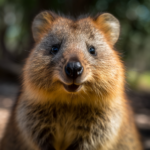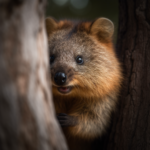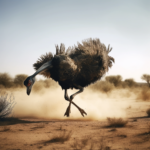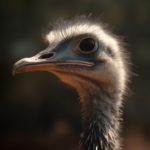The quokka, a small marsupial native to Western Australia, has gained quite a reputation for its friendly and photogenic nature. Tourists and locals alike flock to Rottnest Island to catch a glimpse of these adorable creatures and even take selfies with them. However, amidst all the cuteness, one question often arises: do quokkas bite? In this article, we will explore the behavior of quokkas and whether or not they pose a threat to humans. So, let’s dive in and find out if these charming creatures have a bite to match their bark.
Key Takeaways
- Quokkas have a reputation for being friendly and docile animals.
- While quokkas rarely bite humans, it is important to respect their space and avoid provoking them.
- Interacting with quokkas should be done cautiously and under the guidance of trained professionals, as they are wild animals.
The Quokka: An Overview
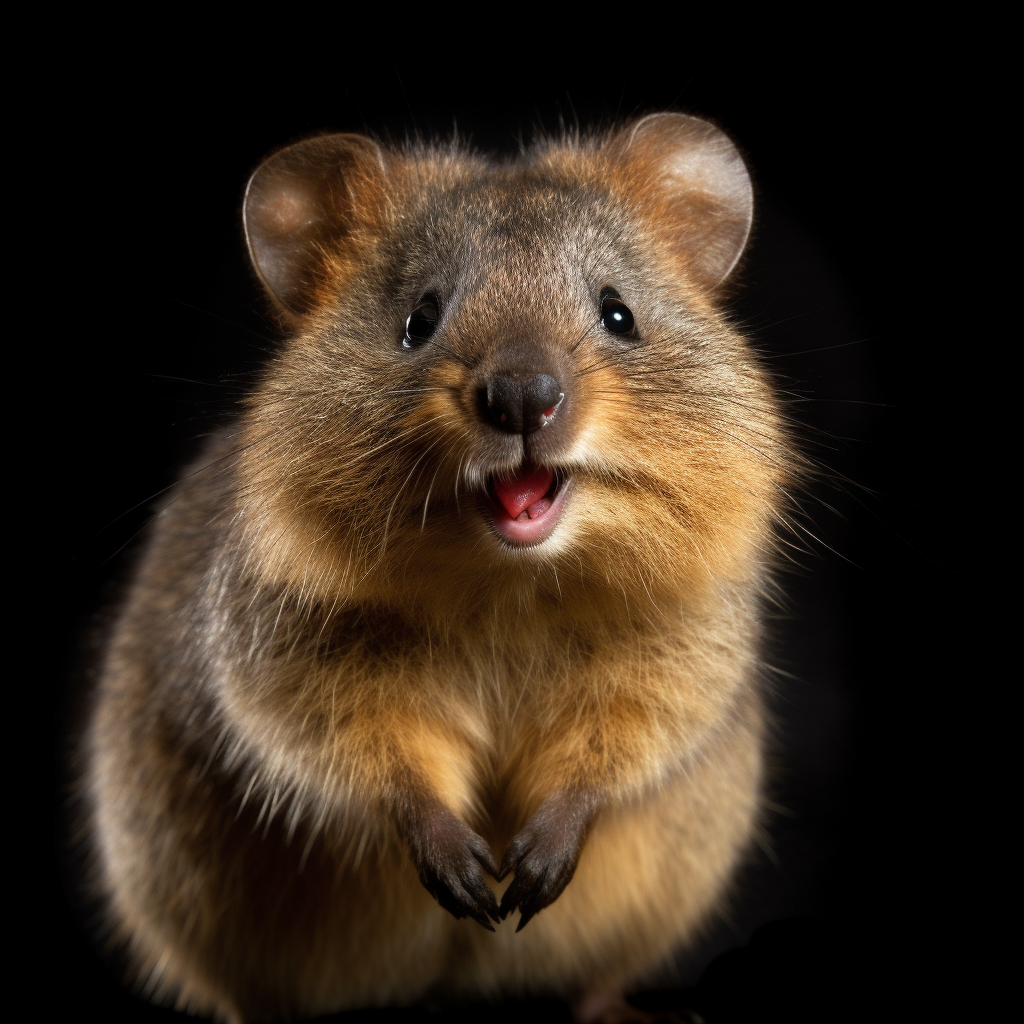
A. Understanding the Quokka
The quokka, also known as Setonix brachyurus, is a small marsupial native to Western Australia. These adorable creatures have gained significant attention due to their friendly and photogenic nature. Quokkas are often referred to as the “happiest animal on Earth” because of their seemingly constant smile. They have become popular subjects for selfies and social media posts.
Quokkas are members of the macropod family, which includes kangaroos and wallabies. They are about the size of a domestic cat, with a body length of around 50 centimeters (20 inches) and a weight of 2.5 to 5 kilograms (5.5 to 11 pounds). These herbivorous marsupials have a stout build, short tail, and round face.
B. The Quokka’s Diet: What Do They Eat?
Quokkas primarily feed on a variety of vegetation, including leaves, grasses, and stems. They have a unique ability to survive on limited water resources, obtaining most of their hydration from the moisture found in their food. This adaptation allows them to thrive in the dry and arid habitats of Western Australia.
Their diet consists of a range of plant species, such as grasses, sedges, leaves, bark, and fruits. Quokkas are known to be opportunistic eaters, meaning they will consume whatever is available to them. They have even been observed nibbling on small shrubs and fallen fruits.
Quokkas are well-adapted to their environment, and their digestive system is designed to efficiently extract nutrients from the vegetation they consume. This allows them to survive on a relatively low-quality diet compared to other herbivorous animals.
Here is a breakdown of the quokka’s diet:
| Food Sources | |————–| | Grasses | | Leaves | | Stems | | Bark | | Fruits | | Shrubs |
It’s important to note that while quokkas are generally docile and friendly, they are still wild animals. It is crucial to respect their natural behavior and not feed them or interfere with their diet. Feeding wild animals can disrupt their natural foraging patterns and may lead to dependency on human-provided food, which can be detrimental to their health.
In the next section, we will explore the behavior and interaction of quokkas with humans to better understand their temperament and any potential risks involved.
Quokka Behaviour: Are They Aggressive?
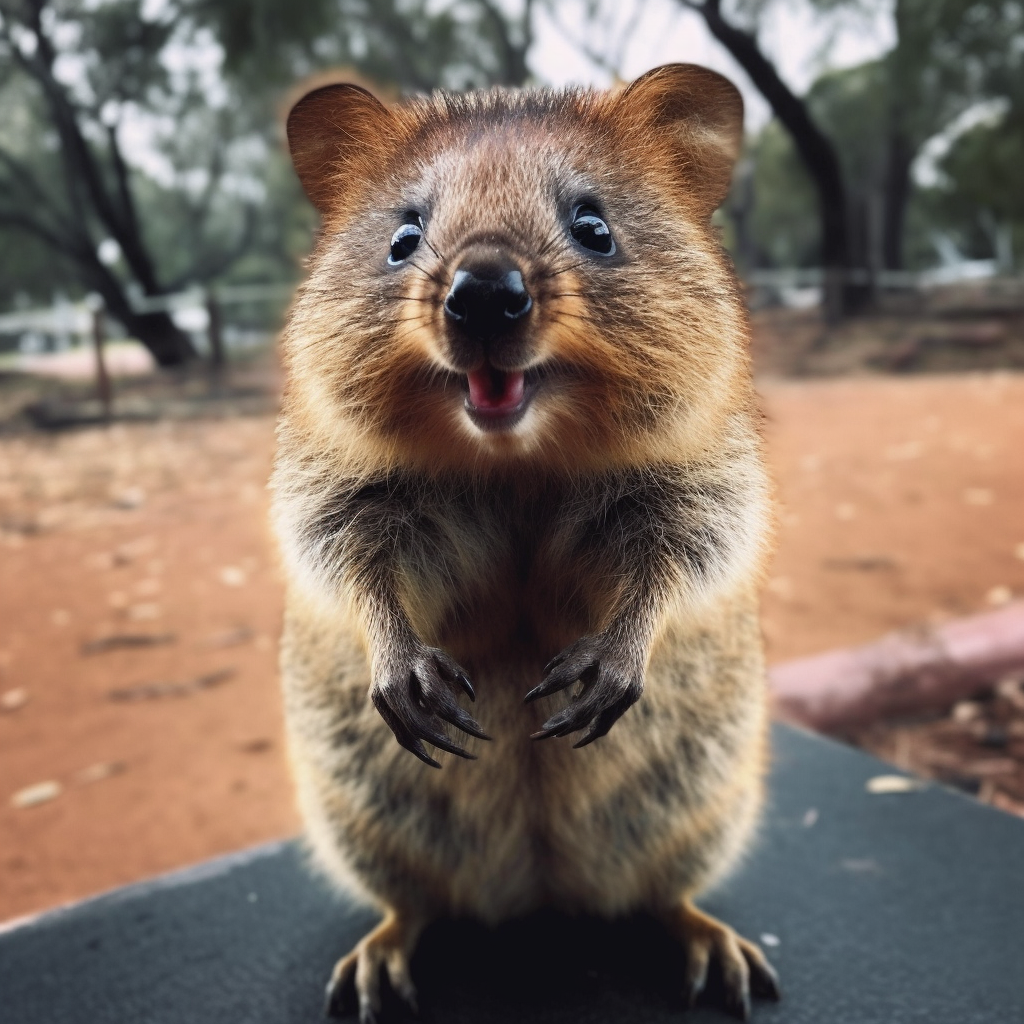
A. The Friendly Nature of Quokkas: Why Are They So Friendly?
When it comes to friendly and adorable animals, quokkas definitely steal the show. These small marsupials, native to Australia, have gained quite a reputation for their friendly nature and photogenic smiles. But what makes quokkas so friendly?
Quokkas are naturally curious and sociable creatures. They have evolved in an environment with limited predators, which has allowed them to develop a trusting nature towards humans and other animals. Their friendly behavior can be attributed to their lack of fear and their innate curiosity.
These little creatures are known to approach humans without hesitation, often seeking out interaction and even posing for selfies. Their friendly demeanor has made them popular among tourists, who flock to places like Rottnest Island to get up close and personal with these adorable marsupials.
B. The Other Side: Can Quokkas Be Aggressive?
While quokkas are generally known for their friendly nature, it’s important to remember that they are still wild animals. Like any other animal, they have their limits and can display aggression if they feel threatened or cornered.
Quokkas have sharp teeth and claws, which they use for self-defense. If they feel threatened, they may bite or scratch as a means of protecting themselves. It’s important to respect their boundaries and not to approach them too closely or try to handle them.
Additionally, it’s crucial to remember that feeding quokkas is strictly prohibited. Feeding them can lead to dependency on human food, which can have negative consequences for their health and natural behavior. It’s best to observe them from a safe distance and let them go about their natural activities.
C. Unraveling the Mystery: Do Quokkas Bite?
Now, the question that often arises is, do quokkas bite? The answer is yes, they can bite, but it’s relatively rare. Quokkas are not known to be aggressive towards humans unless provoked or threatened.
It’s important to understand that quokkas are wild animals and should be treated with respect. Approaching them cautiously and maintaining a safe distance is the best way to ensure both your safety and the well-being of the quokkas.
In the rare event that you do get bitten by a quokka, it’s essential to seek medical attention. Quokka bites can cause infections, and it’s important to clean the wound thoroughly and receive appropriate medical treatment.
In conclusion, while quokkas are generally friendly and approachable, it’s crucial to remember that they are still wild animals. Respecting their boundaries, observing them from a safe distance, and not feeding them are the best ways to ensure a positive interaction with these adorable marsupials. Remember, their well-being and safety should always be a priority.
The Consequences of a Quokka Bite
A. The Potential Danger: Are Quokka Bites Dangerous?
Quokkas are adorable creatures that have gained popularity due to their friendly and photogenic nature. However, it’s important to remember that they are still wild animals, and like any other animal, they have the potential to bite if they feel threatened or cornered. While quokkas are generally docile and non-aggressive, it’s crucial to exercise caution when interacting with them.
Quokka bites can be painful and may cause injury, especially if the animal bites down with force. Their teeth are sharp and designed for tearing vegetation, so a bite from a quokka can break the skin and cause bleeding. While quokkas are not known for their aggression, it’s essential to treat them with respect and avoid provoking them.
B. The Unseen Threat: What Diseases Do Quokkas Carry?
Apart from the immediate physical consequences of a quokka bite, there is also the risk of contracting diseases. Like many wild animals, quokkas can carry various bacteria, viruses, and parasites that can be harmful to humans. While the risk of contracting a disease from a quokka bite is relatively low, it’s still important to be aware of the potential health risks.
One of the diseases that quokkas can carry is leptospirosis, a bacterial infection that can cause flu-like symptoms, organ damage, and even death if left untreated. Quokkas can also carry ticks, which can transmit diseases such as Lyme disease. It’s crucial to seek medical attention if you are bitten by a quokka to ensure proper treatment and prevent any potential complications.
C. The Ultimate Question: Can Quokkas Kill You?
While quokkas are not known to be aggressive or pose a significant threat to humans, it’s important to exercise caution and respect their boundaries. In rare cases, a quokka bite can lead to complications, especially if the wound becomes infected or if the person bitten has an underlying health condition. However, it’s important to note that fatal quokka bites are extremely rare.
Quokkas are small marsupials and do not possess the physical capabilities to cause significant harm to humans. Their bite is not powerful enough to cause severe injury or death. Nevertheless, it’s crucial to treat any bite, regardless of the animal, with caution and seek medical attention if necessary.
In conclusion, while quokka bites are not typically dangerous, it’s important to approach these animals with respect and caution. Avoid provoking them, do not attempt to feed them, and always maintain a safe distance. If you do get bitten, clean the wound thoroughly and seek medical attention to prevent any potential complications. Remember, quokkas are wild animals, and it’s our responsibility to ensure their safety and ours.
Interaction Guidelines with Quokkas
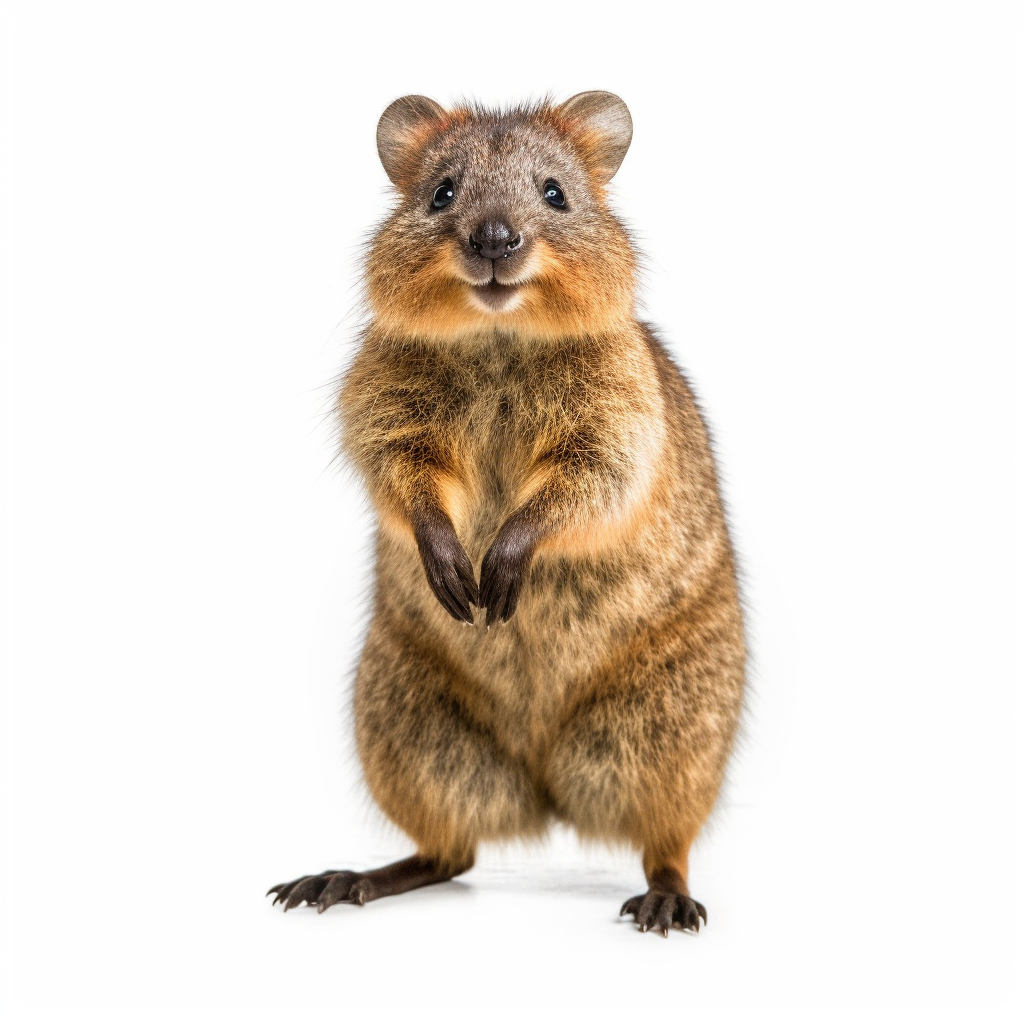
A. The Dos and Don’ts: Touching Quokkas
When it comes to interacting with quokkas, there are certain guidelines you should follow to ensure both your safety and the well-being of these adorable creatures. Quokkas are known for their friendly and curious nature, but it’s important to remember that they are still wild animals. Here are some dos and don’ts to keep in mind when touching quokkas:
Dos:
- Observe from a distance: It’s always best to admire quokkas from a safe distance. Enjoy watching them in their natural habitat without disturbing or approaching them too closely.
- Respect their space: Quokkas need their personal space just like any other animal. Avoid crowding them or making sudden movements that could startle or stress them.
- Stay calm and quiet: Quokkas are more likely to approach if you remain calm and quiet. Sudden loud noises or excessive movements may scare them away.
- Offer food responsibly: While it’s tempting to feed quokkas, it’s important to do so responsibly. If you want to offer food, make sure it’s suitable for their diet and in small quantities. Fresh fruits and vegetables are a good option.
- Capture memories responsibly: Quokkas are famous for their photogenic nature, but it’s important to remember that they are still wild animals. If you want to take a selfie or a picture with a quokka, make sure to do so without causing any harm or distress to the animal.
Don’ts:
- Don’t touch or pick them up: Although quokkas may seem friendly, it’s best to avoid touching or picking them up. They are wild animals and may become defensive if they feel threatened or cornered.
- Don’t force interaction: Quokkas are naturally curious and may approach you on their own terms. However, it’s important not to force interaction or try to grab their attention. Let them come to you if they feel comfortable.
- Don’t offer inappropriate food: Quokkas have a specific diet, and feeding them the wrong food can be harmful to their health. Avoid giving them processed or unhealthy snacks, as it can disrupt their natural feeding habits.
- Don’t invade their habitat: Quokkas have a limited habitat, primarily found on Rottnest Island in Western Australia. It’s crucial to respect their environment and avoid any actions that could harm their natural habitat or disrupt their way of life.
B. The Precautions: How to Avoid Getting Bitten by a Quokka
While quokkas are generally docile and non-aggressive, it’s still important to take precautions to avoid getting bitten. Here are some tips to help you stay safe while interacting with quokkas:
- Approach slowly and calmly: If you want to get closer to a quokka, approach them slowly and calmly. Sudden movements or loud noises can startle them and potentially lead to defensive behavior.
- Avoid direct eye contact: Direct eye contact can be perceived as a threat by quokkas. Instead, try to avert your gaze slightly or look at them from the corner of your eye to avoid any potential aggression.
- Keep your hands to yourself: Avoid reaching out to touch a quokka, as they may interpret it as a threat. Respect their personal space and allow them to approach you if they feel comfortable.
- Don’t corner or trap them: Quokkas may bite if they feel trapped or cornered. Give them an escape route and maintain a safe distance to ensure they feel at ease.
- Supervise children: If you’re visiting an area where quokkas are present, it’s important to supervise children closely. Teach them about the dos and don’ts of interacting with quokkas to prevent any accidental bites or harm to the animals.
By following these guidelines and taking necessary precautions, you can enjoy a safe and memorable experience interacting with quokkas. Remember, it’s crucial to treat these unique creatures with respect and consideration for their well-being. Conclusion
In conclusion, while quokkas are generally known for their friendly and docile nature, it is important to remember that they are still wild animals. Quokkas have been known to bite when they feel threatened or cornered, although these instances are rare. It is crucial to respect their space and observe them from a safe distance to avoid any potential harm. If you ever encounter a quokka in the wild, it is best to appreciate their beauty and unique behavior from afar, without attempting to touch or feed them. By understanding and respecting the boundaries of these adorable creatures, we can ensure their well-being and continue to enjoy their presence on Rottnest Island and other parts of Western Australia.
Frequently Asked Questions
Do quokkas bite?
Yes, quokkas can bite. Although they are generally friendly and curious creatures, they may bite if they feel threatened or if they are mishandled.
What diseases do quokkas carry?
Quokkas can carry a range of diseases including Salmonella and Giardia. These diseases can be transmitted to humans through bites or scratches, so it’s important to maintain a safe distance and not touch them.
Are quokkas aggressive?
Quokkas are not typically aggressive. However, like any wild animal, they can become aggressive if they feel threatened or cornered. It’s best to observe them from a distance and avoid direct interaction.
Can quokkas kill you?
No, quokkas cannot kill you. While a bite or scratch from a quokka can cause injury and potentially transmit disease, they are not capable of causing fatal harm to humans.
What do quokkas eat?
Quokkas are herbivores and their diet mainly consists of grasses, leaves, and bark. They can also eat some types of fruits and vegetables.
Why are quokkas so friendly?
Quokkas are known for their friendly behavior because they live in a relatively predator-free environment and have become accustomed to human presence. However, it’s important to remember that they are wild animals and should not be treated as pets.
How much do quokkas eat a day?
Quokkas typically eat about a kilogram of vegetation per day. Their diet is primarily made up of grasses, leaves, and bark.
Are quokka bites dangerous?
Quokka bites can potentially be dangerous as they can transmit diseases like Salmonella and Giardia. It’s important to avoid handling quokkas to prevent bites.
Why do quokkas bite?
Quokkas may bite if they feel threatened or if they are mishandled. They are wild animals and should be treated with respect.
Do not touch quokkas, why?
Touching quokkas is discouraged because it can stress them and potentially lead to aggressive behavior like biting. Additionally, they can carry diseases that can be transmitted to humans through bites or scratches.

